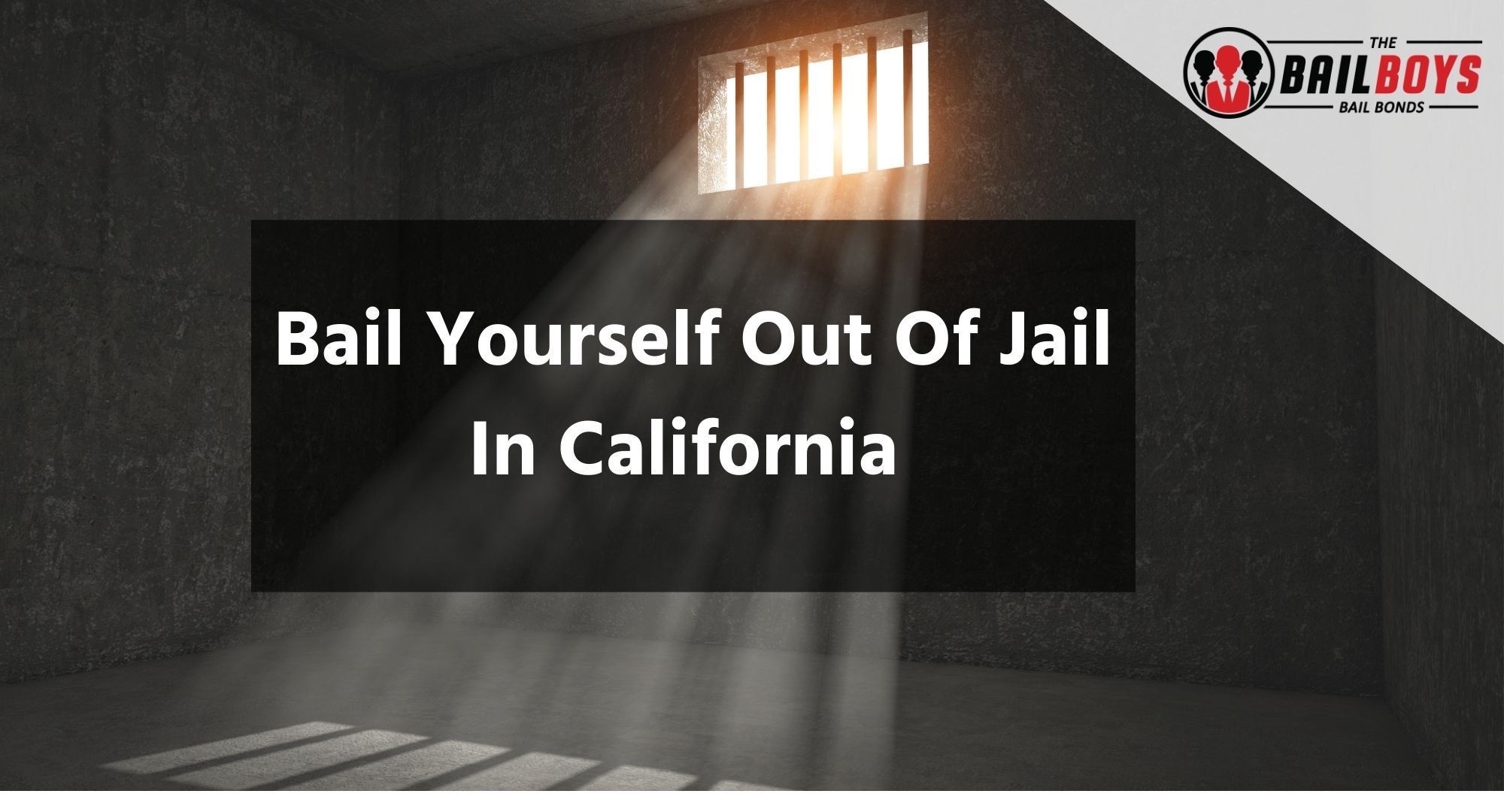
Can You Bail Yourself Out of Jail in California?
One of the most common questions is, “Can you post your own bail?”. Although it depends on the state, the answer is typically yes – but you might want to consider working with a bondsman instead. You can bail yourself out of jail in California if you meet certain criteria and manage the financial requirements. Bailing yourself out of jail can be an important option if you face charges, allowing you (or a loved one) to return home while awaiting trial. However, partnering with a trusted bail bonds service like The Bail Boys has its benefits – which we’ll dive into shortly.
Bailing Yourself Out of Jail in the USA in General
Many states allow individuals to bail themselves out of jail in the United States. The process involves posting a set amount of money or bond to secure the defendant’s return for court proceedings. This system aims to balance the presumption of innocence before trial while ensuring the accused will be motivated to be present at their court dates. The specifics can vary significantly between different states, but the basic principles of bail provide a consistent framework across the country.
How California Bail Bonds Are Unique
California’s legal framework offers various bail options, including cash bonds, surety bonds, and release on one’s own recognizance. The state’s approach ensures individuals have different ways to secure release, depending on their circumstances and finances.
Why Would You Want to Bail Yourself Out of Jail?
Bail is put into place when somebody has been arrested, giving them the option to either pay it be get released from jail until the date of their trial. The amount of money a defendant must put up to be freed from jail pending trial is known as bail. Generally the incentive for bailing yourself out is to not have to wait in jail until the trial date. Bail isn’t meant to be punitive; it’s simply there to ensure that people show up for their trials and all pretrial hearings, in which they are required to attend. When a defendant’s trial is finished, the court returns the bail to whoever put it up. Given the typically large numbers associated with Bail, people choose to work with Bail Bondsman who can make the process more affordable by offering a bond in place of cash bail. There are some key differences between bail vs bond which you may want to familiarize yourself with if you are in this situation.
Considerations When Bailing Yourself Out of Jail
Yes, you can bail yourself out of jail in California, but the process and feasibility depend on several factors including the nature of the crime, the set bail amount, your financial capacity, and your risk assessment. Here’s everything you need to know:
- Eligibility for Self-Bail: Most individuals arrested in California are eligible for bail. However, eligibility can be influenced by factors such as having a local address, not being considered a flight risk, and the nature of the charges. Serious charges, especially those that could result in life sentences or are deemed a community risk, might result in bail denial.
- Types of Bail: If eligible, you can opt for different types of bail. These include cash bonds, surety bonds, or release on your own recognizance (no financial cost). The choice depends on your financial situation and the court’s conditions.
- Bail Amount: The bail amount varies based on the offense’s severity, your criminal history, and other considerations. It can range significantly, making self-bail without assistance challenging for higher amounts.
- Bail Bonds Services: If you can’t afford the full bail amount, bail bond services are available. For a fee (usually 10% of the bail amount), these services will post bail on your behalf. They require you to provide collateral and ensure you appear in court; otherwise, you risk losing the collateral and additional repercussions.
- Legal Considerations: Certain laws affect the bail process. The 8th Amendment protects against excessive bail. The “Zero-Bail” law, intended to allow non-violent offenders unable to afford bail to be released, was rescinded before taking effect. Understanding these laws is crucial.
- Court Appearance: Posting bail means you’re promising to appear in court. Failing to do so can result in the forfeiture of any bail paid or collateral provided, and a warrant may be issued for your arrest.
- Professional Advice: Given the complexities of the bail process, professional advice is often necessary. Legal counsel can guide you through the process, negotiate bail amounts, or argue for release on your own recognizance.
If you or someone you know needs help posting bail please contact The Bail Boys today for a free consultation.
How Can You Post Your Own Bail?
understanding your options for self-bail is crucial. Here are the most common strategies individuals use to regain their freedom while awaiting trial:
1. Post Your Bail With Cash
The most direct strategy for bailing yourself out is to pay the full bail amount in cash. This approach requires no intermediaries, but it does demand that you have the entire sum readily available. If the full amount is beyond your current financial means, you’ll need to consider alternative options.
2. Family Members or Friends Can Bail You Out
You can in fact have a family or friend post your bail. Often, those arrested don’t have the total bail amount at their disposal. In such cases, turning to family members to bridge the financial gap can be a viable solution. Combining your resources with contributions from relatives can accumulate the requisite sum for your release.
3. Requesting Judicial Leniency
In instances of non-violent offenses, it’s possible to appeal to the court for a reduction or waiver of the bail amount. Known as release on one’s own recognizance, this option depends on the judge’s discretion and your specific circumstances. However, it’s imperative to adhere to all court conditions under this release, as failing to appear for your scheduled court date can lead to severe repercussions and a potential re-arrest.
4. Bail Bond Services
When personal finances fall short, and the bail amount is formidable, bail bond agents become invaluable. By offering collateral (property, vehicles, or other assets), you can secure a bail bond. The agent will cover your bail in exchange for a service fee, usually around 10% of the total bail amount. Some bail bondsman, such as The Bail Boys, offer more affordable rates such as $500 down bail bonds or no-money down bail bonds. It’s crucial to honor your court dates under this arrangement. Failing to do so can result in the forfeiture of your collateral and the bail bond agent employing recovery services to locate and return you to custody. Each of these strategies offers a pathway to release from jail in California, but they come with their own set of requirements and consequences. Your financial state, the nature of your charges, and your community ties all play a role in determining the best approach. Regardless of the method, maintaining a commitment to meet all court-imposed obligations is essential for avoiding further legal complications.
Advantages of Using a Bondsman to Bail Yourself Out
Financial Flexibility
One of the biggest benefits of using a bail bondsman is the financial flexibility it provides. Bondsmen typically require only a fraction of the total bail amount as a fee, usually about 10%. So, instead of coming up with the full bail amount, you can simply pay a portion – which is much easier for many people.
Speed and Efficiency
Bail bondsmen are experts in the bail process, which means they can work quickly to get you or your loved one released from jail. Their familiarity with the system can significantly speed up the often complex and time-consuming process of posting bail.
Legal Knowledge
Bail bondsmen are well-versed in legal procedures and can provide valuable advice on the implications of your bail conditions. Their expertise can help ensure you comply with all legal requirements, which can be particularly beneficial if you are unfamiliar with the justice system.
Support Through the Process
Another advantage of opting for a bail bondsman is their ongoing support throughout the bail process. From the initial posting of bail to ensuring you meet all court dates, a bondsman can provide guidance and reassurance during a stressful time.
What Information Does a Bail Bondsman Need to Bail You Out?
If you decide to use a bail bondsman to help secure release from jail, we’ll need specific information from you to process the bail bond. Here’s a list of the common details our team of bail bondsmen would require:
- Full Name and Booking Number: The bail bondsman needs the full name of the person in jail and their booking number to identify them within the system.
- Jail Name and Location: Details of the jail where the person is being held, including the city, state, and possibly the section or ward.
- Bail Amount: The bondsman needs to know the total amount of bail set by the court to determine the bond fee and the terms of the agreement.
- Identification and Proof of Residence: You’ll likely need to provide a government-issued ID and proof of residence to verify your identity and show that you have stable living arrangements.
- Financial Information: Proof of employment, bank statements, or other financial records may be required. This information helps the bondsman assess your ability to pay the bond fee and potentially recover the bail amount if the defendant fails to appear in court.
- Collateral Information: If collateral is necessary for the bond, you’ll need to provide details about the property or assets you’re willing to offer. This could include deeds, vehicle titles, jewelry appraisals, or other documents proving ownership and value.
- Defendant’s Background Information: Some bondsmen might require information about the defendant’s criminal history, the nature of the current charges, their employment status, and any other details that help assess the risk of the defendant not appearing in court.
- References: The bondsman might ask for references to vouch for your character and reliability, or that of the defendant.
- Indemnitor Information: If someone else is guaranteeing the bond (an indemnitor), the bondsman will need similar information from them.
Can You Bail Yourself Out of Jail? Yes, But It’s Better to Contact a Trusted California Bondsman For Help.
If you find yourself or a loved one in need of bailing out of jail, it is crucial to contact a trusted bail bondsman who understands the complexities of California’s bail system. The Bail Boys are available 24/7, ready to assist you anytime. With years of experience and a commitment to respectful, confidential service, we are prepared to help you navigate this challenging situation.
Contact us today for immediate assistance and expert guidance through the bail process in California.




